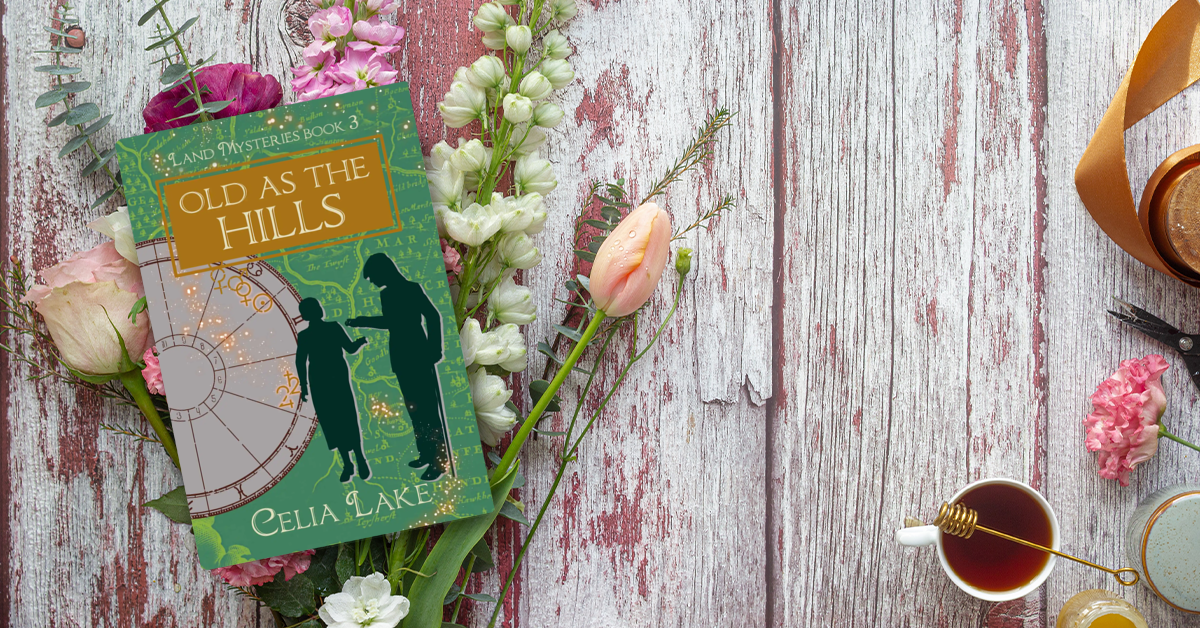Now that Grown Wise is out in the world, there’s even more to talk about when it comes to the land and the land magic! Today’s topic is the different relationships people have with the land – and how that can change over time. (I’m avoiding spoilers here for anything that’s specific to a plot in more than the most general terms.)
The end of the post has a bit more about damage to someone’s land sense.

Everyone has a relationship with the land
The first thing about Albion is that everyone has some relationship with the land. And everyone has some responsibility for that. But that’s complicated – and it’s more complicated in some times and places than others.
Take the Blitz, for example. That’s a terribly hard time to have a relationship with the land, when there are bombs dropping most nights for months and months on end. The immense destruction – and sometimes the extremely random destruction – had a huge effect.
That’s true for the people, for the land, for the senses of community. Sometimes it was about evacuating children and sending them away from their families. Maybe it was about having to rebuild. Sometimes it was about long nights in the depths of the Tube stations and the air raid shelters.
I’ve been working slowly on a bit about Hypatia and Orion’s wedding. It includes Hypatia’s mother getting a look at Southampton as they’re moving between the port (where her ocean liner has docked) and the portal. It’s clear from her brief comments that she hadn’t really understood the tremendous destruction in the places most heavily hit (which definitely included Southampton).
Of course, some people are more or less sensitive to that relationship. Grown Wise has Ursula (more on her in a moment). But Jim – and his family – are farmers, from a long line of farmers. They pay attention to the land season in, season out, and all that means. Teachers at the Five Schools become familiar with the immediate area of the schools and the way the magic reflects and shapes itself around the students who live there.
And of course, some people have a more specific relationship.
Lords and Ladies
Those who hold the land magic in specific have a wide range of relationships with it (and we’ll revisit the Fortiers in particular in a couple of weeks). Fortunately, many of the land magic rituals are somewhat flexible. It’d be bad planning to set up a system that assumed equal expertise of everyone, over a long period of time and with widely varying magical training!
Most of the time, being Lord or Lady means tending to the land magic. A lot of them do this somewhat by rote – they do the proper ritual in the proper season. There are some checks to confirm that (which can be done by the Council or an appropriate specialist). Most of the time, the combination works very well. The Hare and the Oak is an example of when family pressures make it harder to do independent checks until Lionel Baddock insists.
The seasonal rites
There’s also a way in which those rites – done on a particular estate – are sort of a doctrine of sympathies reaction for the entire area under consideration. (So West Sussex for the Fortiers, the southern half of Kent for the Edgartons, the northern New Forest for the Carillons). Much as in some of the French-influenced mediaeval Arthurian myths, these work on the principle that the land and the lord are one. If the central demesne estate is doing well, the larger land area will also flourish. It’s a good theory, and it’s even sometimes true!
(In reality, it’s not like this is a simple maths problem. There are plenty of external factors that are complex to measure, some of which aren’t magical at all.)
An example: Ytene
The Carillons are a good example here. Temple was not particularly sensitive to the land magic, even before the events that begin in Bound for Perdition and lead to his death. Geoffrey, on the other hand, loses his land sense in the trenches, but manages to regain it. Once he becomes Lord, he’s able to more sensitively guide the land magic back to better health.
To quote Alysoun in a bit of the Seeking A Wife series on Patreon. (This is from the episode that will be out in June 2025):
“You have a white hart, verdant greenery, good harvests, and a decided lack of flooding and mould.” Alysoun pointed out dryly. “I’m not entirely sure what else you’re waiting for, except an angel descending and proclaiming you have done well.”
Gabe, bless him, is way off the scale on the ‘highly sensitive’ end.
Council
Obviously, another piece of the land magic – and making sure it’s going all right – is very much in the remit of the Council. You can think of them as being especially responsible for the connecting bits, the boundaries where ‘who’s responsible for this’ gets a little more shaky. And they’re also responsible for
(This does not mean they’re speedy about responses. They’re often slow to act. Not least because of the political problems that happen when you’re pushy about someone not living up to their obligations. But they’re also slow because anything that takes multiple cycles to become obvious could just be a bad year.)
This does shift over the course of the period I’ve been writing in. As Alexander and Cyrus quietly spend more time upstairs in the Challenge chamber once Cyrus becomes Head of the Council, Alexander gets some additional data at various points about how things are going in particular places. Cyrus does too. These are a little unspecific – it’s more a general vibe than a specific diagnosis. But it’s enough to help get someone to go have a chat. They can see how things feel, and ask some pointed questions earlier in the process of a problem.
The Society of the White Horse
(and related, Many Are The Waters)
Grown Wise gives us a much better glimpse into the Society of the White Horse. They’re the secret society most interested in the land magic, though from a different angle. Many of them are farmers, involved in agriculture, or otherwise connected with the land in direct and pragmatic ways. To go with that, they also have a more mystic bent about it. One of their practices involves going out and sleeping directly on the ground with an eye to informative dreams.
They often work with Many Are The Waters on collaborative projects. Grown Wise has an example where there was horrendous flooding in the Thames valley in the spring of 1947. That Lammas, the two societies are collaborating. The White Horse folks to help reset some patterns, and the Waters to help carrying that re-patterning up and down the river (and to other rivers, as they can). Think of it like making a net of roots to help re-stabilise the land and discourage more erosion, magically.
Damage to the land sense
Finally, there’s the question of damage to the land sense. Albion has known about this result from certain kinds of trauma for a long time. But the Great War was an entirely different scale. As men (mostly men) came home from the War, it took a long time for people to begin to figure out what was going on – never mind what to do about it.
What they know by the very early 1930s looks like this:
- Damage to the land sense happened to a wide range of people. Mostly, it looks like a lack of the sense, a gap where there used to be an ability. In some people, it results in an over-sensitivity, like any information from that route is raw.
- It matters more directly for some people than for others. Specifically, the Lords or Heirs of the land magic, either those who were named at the time or named later. But it also had an impact on some other professions – people working closely in Flora or Materia, for example.
- Some people demonstrated an ability to heal at least some of their land sense. Some people didn’t.
- Given enough data over time, the working hypothesis by the 30s is that it was worse for people who served directly in the trenches for any length of time. And especially those who were exposed to gas attacks or utterly overrun trenches (i.e. where there was a lot of death suddenly in close quarters in the trench). That isn’t absolute, individual resilience and response varied.
- Other kinds of trauma (of which there are many) might also affect things, but the connections are less clear: mostly if the trauma is bad enough that someone can’t function in their day to day life, there’s more of a chance for it to affect their magic.
Looking at some specifics
So when we look at some of our key characters:
Geoffrey Carillon loses his land sense while he’s in the trenches early in the war. He’s aware he’s lost it when he comes back to Ytene very briefly in 1916 to be named his brother’s Heir. When he returns there in 1917 after nearly dying, he manages to connect with the land again.
(He thinks – and he’s right about this – that it’s a combination of being tended with water from the estate’s healing well and having several weeks of recovery on the land right after that.)
Isembard never served in the trenches, other than perhaps briefly passing through. While he has other trauma from the War, his land sense came out of it mostly intact. (However, you might note that his strong affiliation is not actually to Arundel and Sussex, but to Schola.)
Orion obviously didn’t serve in the Great War, and his service in the Second World War involved some fortifications, but not the same sort of grinding misery as the trenches. He also has trauma, but it didn’t really dent his land sense. (It also helps in this case that he was actually Lord and had established that particular connection in 1938, before the war began.)
His injury was also sudden, which often changes the way the trauma plays out (and he was shipped home fairly promptly.) In someone who’d had less of a connection with the demesne estate earlier in his life, his ex-wife’s choices might also have done damage to his land magic, but in this case, Orion was clear it was his home first, not hers.
I hope this has been an interesting look at the topic – and drop me a note if you’ve got other questions!
